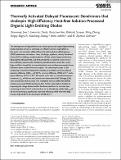Thermally activated delayed fluorescent dendrimers that underpin high-efficiency host-free solution-processed organic light emitting diodes
Date
09/06/2022Author
Grant ID
838009
812872
SRF\R1\201089
RPG-2016-047
EP/P010482/1
Keywords
Metadata
Show full item recordAbstract
The development of high-performance solution-processed organic light-emitting diodes (OLEDs) remains a challenge. An effective solution, highlighted in this work, is to use highly efficient thermally activated delayed fluorescence (TADF) dendrimers as emitters. Here, the design, synthesis, density functional theory (DFT) modeling, and photophysics of three triazine-based dendrimers, tBuCz2pTRZ , tBuCz2mTRZ , and tBuCz2m2pTRZ , is reported, which resolve the conflicting requirements of achieving simultaneously a small ΔEST and a large oscillator strength by incorporating both meta- and para-connected donor dendrons about a central triazine acceptor. The solution-processed OLED containing a host-free emitting layer exhibits an excellent maximum external quantum efficiency (EQEmax) of 28.7%, a current efficiency of 98.8 cd A−1, and a power efficiency of 91.3 lm W−1. The device emits with an electroluminescence maximum, λEL, of 540 nm and Commission International de l'Éclairage (CIE) color coordinates of (0.37, 0.57). This represents the most efficient host-free solution-processed OLED reported to date. Further optimization directed at improving the charge balance within the device results in an emissive layer containing 30 wt% OXD-7, which leads to an OLED with the similar EQEmax of 28.4% but showing a significantly improved efficiency rolloff where the EQE remains high at 22.7% at a luminance of 500 cd m−2.
Citation
Sun , D , Duda , E , Fan , X , Saxena , R , Zhang , M , Bagnich , S , Zhang , X-H , Koehler , A & Zysman-Colman , E 2022 , ' Thermally activated delayed fluorescent dendrimers that underpin high-efficiency host-free solution-processed organic light emitting diodes ' , Advanced Materials , vol. 34 , no. 23 , 2110344 . https://doi.org/10.1002/adma.202110344
Publication
Advanced Materials
Status
Peer reviewed
ISSN
0935-9648Type
Journal article
Description
This project has received funding from the European Union’s Horizon 2020 research and innovation program under the Marie Skłodowska-Curie grant agreements No. 838009 (TSFP) and No 812872 (TADFlife). D.S. acknowledges support from the Marie Skłodowska-Curie Individual Fellowship (TSFP), the National Postdoctoral Program for Innovative Talents (BX201700164), and the Jiangsu Planned Projects for Postdoctoral Research Funds (2018K011A). S.B. acknowledges support from the German Science Foundation (392306670/HU2362). The St Andrews team thank the Leverhulme Trust (RPG2016047) and EPSRC (EP/P010482/1) for financial support. X.Z. would like to thank the support from the National Key Research & Development Program of China (Grant No. 2020YFA0714601, 2020YFA0714604), the National Natural Science Foundation of China (Grant No. 52130304, 51821002), Suzhou Key Laboratory of Functional Nano & Soft Materials, Collaborative Innovation Center of Suzhou Nano Science & Technology, the Priority Academic Program Development of Jiangsu Higher Education Institutions (PAPD), the 111 Project, Joint International Research Laboratory of Carbon-Based Functional Materials and Devices. E. Z.-C. is a Royal Society Leverhulme Trust Senior Research fellow (SRF\R1\201089).Collections
Items in the St Andrews Research Repository are protected by copyright, with all rights reserved, unless otherwise indicated.

